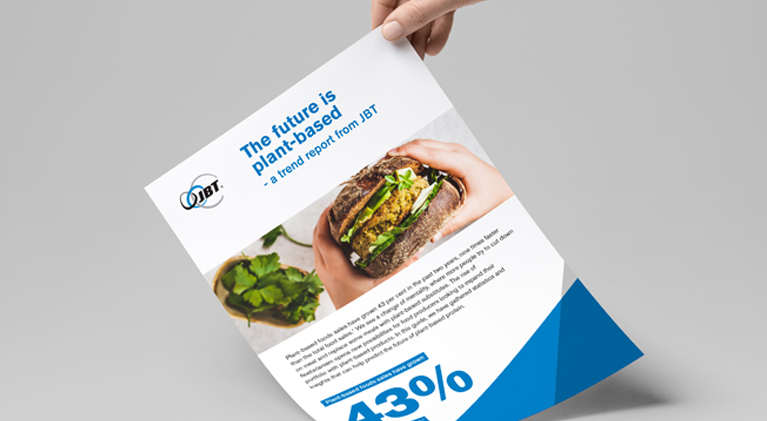Even though plant-based products have been available on the market for many years now, it is not until recent years that the segment has boomed. The increase is driven by a strong health- and sustainability trend among consumers, that is expected to continue at an even higher pace. In 2030, the global market for plant-based substitutes is estimated to reach $85 billion (USD), while the demand for beef and dairy products will shrink by 80-90 per cent by 2035.1 During the pandemic, the sales of plant-based alternatives to animal-derived food increased significantly.2 However, developing a competitive product can be a challenge. What is the consumer looking for, and what motivates the choice of one product over another? Healthy and savory products with an appealing appearance, for sure. But also price-level, flexibility and a strong brand that aligns with the consumer’s values.
Driving forces behind a plant-based diet
A study carried out by Euromonitor3 declares that the main driver behind a plant-based diet is climate concern. Sixty percent of the global respondents are worried about climate change. Thereof twenty-seven per cent are trying to cut down on or avoid meat intake.
There is a strong linear correlation between climate worry and meat reduction. Ethical concerns regarding animal welfare, alongside the health benefits of a flexitarian diet, have contributed to the meat substitute market in western Europe. However, the pricing and availability of plant-based products are the key factors that currently hold back the penetration worldwide. Nevertheless, meat substitutes can gain more consumers among the climate concerned group that are not actively reducing meat by offering tasty, healthy and exciting products at affordable prices. Therefore, as the demand grows, there are great possibilities for food producers to gain market shares in this emerging market.
Taste, texture and appearance
The Euromonitor study finds that consumers are unwilling to compromise on taste to achieve other benefits, such as sustainability, price or brand. Some buyers are looking for substitutes that taste and behave like meat, and others are willing to try new kinds of protein. Regardless of the protein source – soy, oats, peas, tofu or maize – creating a tasty plant-based product requires know-how, a good recipe, and high-quality, reliable equipment that delivers the same result repeatedly.
Those asked by Euromonitor named cold cuts and burgers as target substitutes to be further improved. The current assortment was either too narrow or the taste unsatisfactory. However, the most significant difficulty of imitating animal meat is finding the right flavour, colour, and mouthfeel. We at JBT have designed and developed processes and systems – from cooking to freezing – which do just that, but also are tailored to meet the needs of each individual processor, while also complying with stringent hygiene standards required when handling plant-based products.
Widen your portfolio and retain customers
The flexibility of the application also drives consumers to test new protein sources. Mince, nuggets, sausages, schnitzels and filets are just some varieties that are easy to find in the store and can be made with vegan protein. A broader plant-based portfolio with products for multiple dishes can both attract and retain customers to your brand.
Affordable products
The production of plant-based meat alternatives can be complex and expensive. As a result, many manufacturers are looking for more affordable equipment to start with. But, once proof-of-concept is received, it’s time to invest in better machinery, since a more efficient production process is necessary to create an affordable (and profitable) product. JBT can help you find the right equipment for your needs, innovate your production process, and scale up the capacity to keep growing consumer demand.
Prepared meals that are ready to eat
Another insight that we believe make a more competitive plant-based product is the increasing consumer demand for prepared meals. Customers today are expecting the food they buy to be ready to eat. Of course, this brings new issues to the table, such as food safety, shortened shelf-life and how to prepare the meal in your production line.
Strong brands are more popular
In the long term, your success does not solely lie in the product. Even though you can patent vegan products, there will always be others who try to imitate you. Plant-based pioneers such as Quorn Foods started with innovative products but were successful because of their excellent brand-building skills. They communicate in a way that distinguishes them from others, and they both have a clear purpose that aligns with the consumer’s values. For example, climate concern is one of the drivers for people to eat more vegan food, so a brand that tries to make a difference for the planet will appeal to this group. Furthermore, a strong brand will establish a special connection with the consumer, creating both returning customers and brand ambassadors.
Are you interested in growing your business in plant-based protein?
JBT is here for you! Contact your local sales office or fill out the form, and we will get in touch shortly.

The Future is Plant-based
References:
- Santo Raychel E., Kim Brent F., Goldman Sarah E., Dutkiewicz Jan, Biehl Erin M. B., Bloem Martin W., Neff Roni A., Nachman Keeve E. (2020), Considering Plant-based Meat Substitutes and Cell-Based Meats: A Public Health and Food Systems Perspective, Frontiers in Sustainable Food Systems, 4: 134. DOI: 10.3389/fsufs.2020.00134.
- Euromonitor International (2019), Driving Forces Behind Plant-based Diets: Climate Concern and Meat Reduction, Passport.
- Euromonitor International (2021), Choosing Substitutes: The Rising Tide of Non-animal Proteins, Passport.
Need help developing your product?
With the world’s largest database with application tests and more than 30 years of experience in processing plant-based protein, we know how to make the most out of your product in terms of taste, yield and consistency. The food experts at our Food Technology Centers help you develop your ideas or enhance existing ones. The tests can be conducted on our testing site in person or via live video link or as on-site demonstrations with our mobile lab equipment in your facility.

